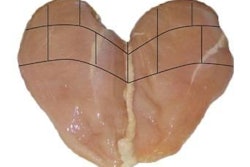When the U.S. government on October 1 furloughed what it deemed non-essential government employees, many technicians at the U.S. Department of Agriculture (USDA)'s Center for Veterinary Biologics (CVB) did not make the cut. Since that agency is responsible for overseeing the release of vaccines essential for the health of animals raised for food production, it could have a very negative impact on the poultry and livestock industries.
Craig Wallace, Ceva Animal Health CEO and North America zone director, said that with the furloughs, new batches of vaccines cannot be released for distribution. Wallace added that his company was informed by federal officials that the situation with CVB employees will be re-evaluated after 14 days, but for many poultry and livestock producers that rely on a steady supply of vaccines, 14 days will not be enough.
"In the poultry business, if you have a company that produces 40 million birds a week, they run on a just-in-time inventory. They don't keep a lot of that product around," said Wallace. "We have 190 million doses of product waiting to be released, and within a couple of weeks, we'll run out of product. So these companies will be faced with choices of either stopping production or dramatically reducing production, or continue to produce and run the risk of disease in our flocks and herds. None of the choices are good ones."
Wallace believes other animal health companies have similar amounts of vaccines on hand, adding to the potential vaccine shortage problem that will hit the poultry, swine and ruminant sectors.
Sen. Chris Coons, D-Del., also shared his concerns with the furloughs with members of the National Chicken Council. His views can be seen on a video on WATTAgNet.
Human health also at risk
Ron Phillips, vice president for legislative and public affairs for the Animal Health Institute, agrees with Wallace, saying, "we don't believe we have 14 days."
While concerned about the health of the animals raised for food production and its impact on the meat and poultry industries, he said there are also human health risks involved.
"We've been talking about a connection between animal health and public health for years, and this is a perfect example," he said. "Salmonella vaccines are used in the poultry industry to control Salmonella, food-borne pathogen. Without that control, we have a public health problem."
Phillips added that it could also affect the availability of rabies vaccines for pets, which can have harsh animal effects.
"There are fairly grave health consequences at stake," he said.
Spreading the news to poultry producers
Ceva was caught off guard with the announcement of the furlough of CVB employees, and so were many others in the industry.
Wallace said Ceva spent a large part of the October 1 and 2 contacting producers that rely on the vaccines about the furloughs. None of the companies they contacted were previously notified by the federal government.
Effort initiated to urge government to reinstate CVB technicians
Since receiving word of the CVB furloughs, Wallace, whose office is based out of Lenexa, Kan., has written to Sens. Pat Roberts and Jerry Moran and Rep. Kevin Yoder - all Kansas Republicans - as well as to the USDA, urging it to reinstate the CVB technicians responsible for releasing these vaccines. They were told that this is not only an animal health issue, but a human health issue as well. Staff members from all three members of Congress have returned calls and expressed empathy, said Wallace.
"They're trying to be supportive without being overpromising," he said.
Ceva has also forwarded a letter to the Animal Health Corridor of Kansas City, Kan., and asked to have it circulated to other animal health companies for their input and signatures. From there, the letter will be sent to U.S. Secretary of Agriculture Tom Vilsack; senators and representatives from all of the major poultry, egg, beef and swine producing states; and the heads of the agriculture departments of those states, Wallace said.
Phillips said his organization has also been actively lobbying to reinstate CVB technicians, but that has been challenging.
"Even on a good day, it's hard to track down the source of action. This is not a good day. With the shutdown, it makes it doubly hard to reach the source of action, but we are hammering away trying to do that."
















